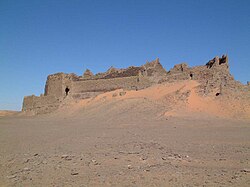Ksar: Difference between revisions
Amazigh Man (talk | contribs) No edit summary |
Amazigh Man (talk | contribs) No edit summary |
||
| Line 3: | Line 3: | ||
{{Onesource|date=November 2007}}[[Image:Ksar.jpg|thumb|250px|''Ruins of the ksar at [[Timimoun]], [[Algeria]].'']] |
{{Onesource|date=November 2007}}[[Image:Ksar.jpg|thumb|250px|''Ruins of the ksar at [[Timimoun]], [[Algeria]].'']] |
||
A '''Ksar''' ([[Berber languages|Berber]]: '''Aghrem''', [[Arabic language|Arabic]]: [[wikt:قصر|قصر]], ''qaṣr'') is a term describing a [[Berber]] [[village]] consisting of generally attached houses, often having collective [[granaries]] and other structures ([[mosque]], bath, oven, shops) widespread among the [[oasis]] populations of the [[Maghreb]] (northern [[Africa]].) Ksars are sometimes situated in mountain locations to make defense easier; they often are entirely within a single, continuous wall. The building material of the entire structure is normally [[adobe]], or cut stone and adobe. The idea of the ksar as a granary is a confused notion of two things, the granary itself, found within a ksar, and the ksar, which is a village, normally with granaries within it. ''' |
A '''Ksar''' ([[Berber languages|Berber]]: '''Aghrem''', [[Arabic language|Arabic]]: [[wikt:قصر|قصر]], ''qaṣr'') is a term describing a [[Berber]] [[village]] consisting of generally attached houses, often having collective [[granaries]] and other structures ([[mosque]], bath, oven, shops) widespread among the [[oasis]] populations of the [[Maghreb]] (northern [[Africa]].) Ksars are sometimes situated in mountain locations to make defense easier; they often are entirely within a single, continuous wall. The building material of the entire structure is normally [[adobe]], or cut stone and adobe. The idea of the ksar as a granary is a confused notion of two things, the granary itself, found within a ksar, and the ksar, which is a village, normally with granaries within it. '''Ksars''' form one the main manifestations of [[Berber architecture]]. |
||
''Ksar'' is an [[Arabic language|Arabic]] word, more correctly transliterated as ''qsar'', singular, and ''qsur'' (قصور), plural. The [[Berber languages|Berber]] (Amazigh) equivalent is ''aghrem'' (singular) or ''ighrem'' (plural). Ksar is generally translated as "castle" in English, although the simplest rendering might be "fortified village," with the word sometimes taking on the meaning of "fort" depending on its specific function. |
''Ksar'' is an [[Arabic language|Arabic]] word, more correctly transliterated as ''qsar'', singular, and ''qsur'' (قصور), plural. The [[Berber languages|Berber]] (Amazigh) equivalent is ''aghrem'' (singular) or ''ighrem'' (plural). Ksar is generally translated as "castle" in English, although the simplest rendering might be "fortified village," with the word sometimes taking on the meaning of "fort" depending on its specific function. |
||
Revision as of 18:38, 23 February 2009
- for the town and commune of Mauritania see Ksar, Mauritania
- for the French champion racehorse, see Ksar (horse)
This article relies largely or entirely on a single source. (November 2007) |

A Ksar (Berber: Aghrem, Arabic: قصر, qaṣr) is a term describing a Berber village consisting of generally attached houses, often having collective granaries and other structures (mosque, bath, oven, shops) widespread among the oasis populations of the Maghreb (northern Africa.) Ksars are sometimes situated in mountain locations to make defense easier; they often are entirely within a single, continuous wall. The building material of the entire structure is normally adobe, or cut stone and adobe. The idea of the ksar as a granary is a confused notion of two things, the granary itself, found within a ksar, and the ksar, which is a village, normally with granaries within it. Ksars form one the main manifestations of Berber architecture.
Ksar is an Arabic word, more correctly transliterated as qsar, singular, and qsur (قصور), plural. The Berber (Amazigh) equivalent is aghrem (singular) or ighrem (plural). Ksar is generally translated as "castle" in English, although the simplest rendering might be "fortified village," with the word sometimes taking on the meaning of "fort" depending on its specific function. The word is part of place names across Morocco, Algeria, and Tunisia, — the region called the Maghreb; and is particularly prevalent on the Saharan side of the various ranges of the Atlas Mountains and the valley of the Draa River. A light fruity white wine of this name is made from Clairette Blanc grapes grown in the foothills of the Atlases.
The Spanish terms Alcázar and Portuguese Alcácer are derived from this Arabic word, and appear in place names and buildings originating as fortresses.
Places named Ksar
- El Qsar es Seghir, Moroccan stronghold in the Straits of Gibraltar, between Tangier and Ceuta.
- Ksar-el-Kebir, location of the Battle of Al Kasr al Kebir, influenced Moroccan, Portuguese and Spanish history.
